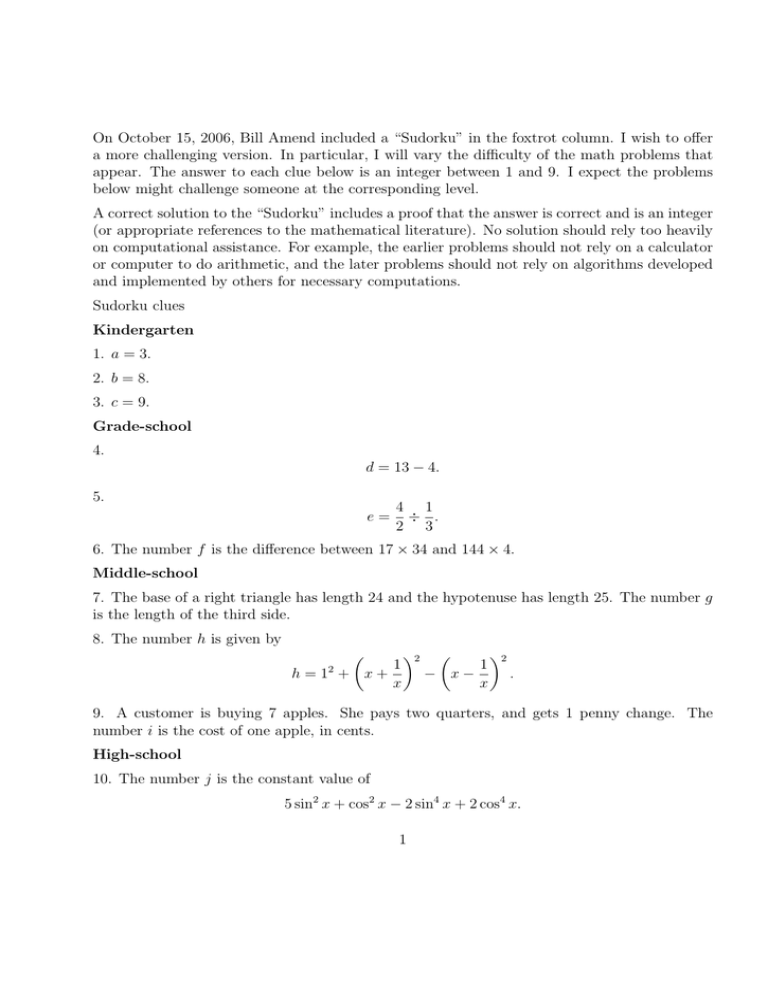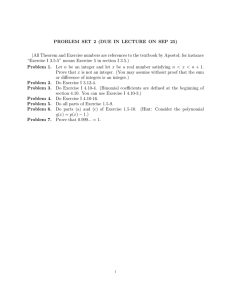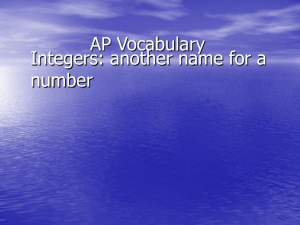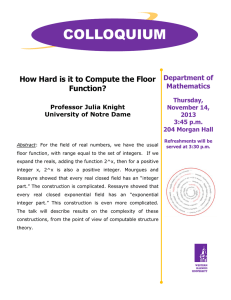On October 15, 2006, Bill Amend included a “Sudorku” in... a more challenging version. In particular, I will vary the...
advertisement

On October 15, 2006, Bill Amend included a “Sudorku” in the foxtrot column. I wish to offer a more challenging version. In particular, I will vary the difficulty of the math problems that appear. The answer to each clue below is an integer between 1 and 9. I expect the problems below might challenge someone at the corresponding level. A correct solution to the “Sudorku” includes a proof that the answer is correct and is an integer (or appropriate references to the mathematical literature). No solution should rely too heavily on computational assistance. For example, the earlier problems should not rely on a calculator or computer to do arithmetic, and the later problems should not rely on algorithms developed and implemented by others for necessary computations. Sudorku clues Kindergarten 1. a = 3. 2. b = 8. 3. c = 9. Grade-school 4. d = 13 − 4. 5. e= 4 1 ÷ . 2 3 6. The number f is the difference between 17 × 34 and 144 × 4. Middle-school 7. The base of a right triangle has length 24 and the hypotenuse has length 25. The number g is the length of the third side. 8. The number h is given by 1 h=1 + x+ x 2 2 1 − x− x 2 . 9. A customer is buying 7 apples. She pays two quarters, and gets 1 penny change. The number i is the cost of one apple, in cents. High-school 10. The number j is the constant value of 5 sin2 x + cos2 x − 2 sin4 x + 2 cos4 x. 1 11. The number k is the radius of the circle inscribed in a right triangle with sides 8, 15 and 17. 12. The number l is given by q q √ √ 3 3 l = 162 + 33 21 + 162 − 33 21. Calculus 13. A package is dropped by an airplane. When it hits the ground, its height was decreasing at mi . An observer stands 3 miles from where it strikes the ground. When it hits the ground, 4 min mi mi . The number m is the speed in min of the its distance to the observer was increasing at 3 min package when it hit the ground. 14. The number n is given by ∞ Z 10e−x cos(x/3) dx. n= 0 15. The number o is given by ∞ X n2 o= n=1 2n . Math major 16. If Z 1 x15 − x dx, ln(x) y= 0 then the number p is given by ∞ X yk p= k=0 k! . 17. A vibrating string has fixed ends, length 2, and parameter c = 1. At time t and position x with 0 ≤ x ≤ 2, the displacement is u(x, t). Initially, u(x, 0) = 1 − |1 − x| and ∂u (x, 0) = 0. ∂t The number q is u(1, 4). 18. The number of (non-isomorphic) cyclic groups G with |Aut(G)| = 2 is r. Graduate student 19. The number s is given by Z ∞ s = lim n→∞ 2x dx. +1 xn 0 2 20. Let Y ⊆ A3 be the curve defined parametrically by x = a3 , y = a5 and z = a7 . Let I(Y ) ⊆ C[x, y, z] be the ideal of all polynomials f : C[x, y, z, w] → C that vanish identically on Y . The number t is the minimal number of generators for I(Y ). 21. There are u integers x so that √ x3 − 256x + 1024 is also an integer. Mathematics Professor 22. The number v is the largest positive integer for which S v (the unit sphere in (v + 1)dimensional space) is parallelizable. 23. The number w is the number of non-abelian finite simple groups S that occur as a composition factor of some group G with a conjugacy class of size |G|/3. √ 24. The number x is the Iwasawa λ-invariant of the Z3 -cyclotomic extension of Q( −239). a e g n o j b l m i c t u r w v k f h d q x s p 3



